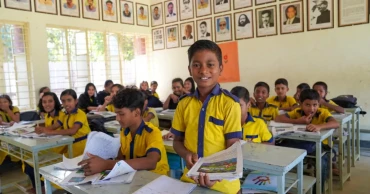Classroom
Ambassador Lee visits South Korea-supported innovative ICT-integrated pilot classroom in Dhaka
South Korean Ambassador to Bangladesh Lee Sunday visited the Government Laboratory High School in the capital, where an innovative ICT-integrated classroom opened in 2019 with the support of the South Korean government.
In his speech to the students, Ambassador Lee said: "Education has been a major driving force in Korea's rapid economic growth. Korea will continue to help improve Bangladesh's education services so that it can build a brighter future with talented students."
The Korean government helped establish innovative ICT-integrated classrooms in which students can use state-of-art technology to maximise the efficiency of their study at the Government Laboratory High School and Government Mohammadpur Model School and College in Dhaka in 2019.
Read more: South Korean envoy Lee for strengthening infrastructure cooperation with Bangladesh
3 years ago
When classrooms are child-friendly and safe, children are motivated to learn, research shows
UNICEF has handed over 110 classrooms across 22 schools in Cox’s Bazar to the government of Bangladesh.
Out of the 110 classrooms, 76 are newly constructed while 36 have been renovated, said the UN agency on Sunday.
The new and improved classrooms will provide child-friendly learning spaces and better access to education for over 8,000 Bangladeshi children.
The initiative is part if UNICEF’s support to Bangladeshi children in the district of Cox’s Bazar, a district which is coping with the challenge of hosting nearly 1 million Rohingya refugees from Myanmar.
In addition, UNICEF is supporting the Government of Bangladesh to strengthen teaching and learning through grants that benefit all 657 schools in Cox’s Bazar.
The “school level improvement plan” grant allows schools to themselves identify and address pressing needs.
Read: Supporting Mothers at Work: UNICEF joins hands with Bangladesh garment industry
“Children spend a large part of their waking hours in the classroom, and really, the classroom should feel like a second home for children. Research shows that when classrooms are child-friendly and safe, children are motivated to learn, and school enrolment, attendance and completion rates go up,” said Sheldon Yett, UNICEF Representative to Bangladesh.
Constructed and renovated with support from the Global Partnership for Education, the classrooms have been fully furnished with desks, benches and chairs for children and teachers.
UNICEF has also put in place access ramps and child-friendly sanitation facilities for children with disabilities.
Prior to the construction works, UNICEF conducted a detailed assessment of needs in 100 schools to identify 22 schools most in need.
The 110 classrooms were received by the Directorate of Primary Education under the Ministry of Primary and Mass Education.
“Congestion was an issue for the children in the eight Upazilas of Cox’s Bazar. These schools have made it possible for us to provide a healthy and inclusive learning environment which is essential for children’s education on the road to recovery from COVID-19,” said Shah Rezwan Hayat, Director General for the Directorate of Primary Education.
Read: Girls lag behind boys in mathematics for negative gender norms , stereotypes: UNICEF
The burden of congestion in schools is felt throughout Bangladesh. Government statistics show that there are over 1,600 congested public schools in the country.
In addition, the average classroom in Bangladesh has more than 40 students, while according to the Government’s primary school quality standards; each classroom should have 40 or fewer students.
3 years ago



